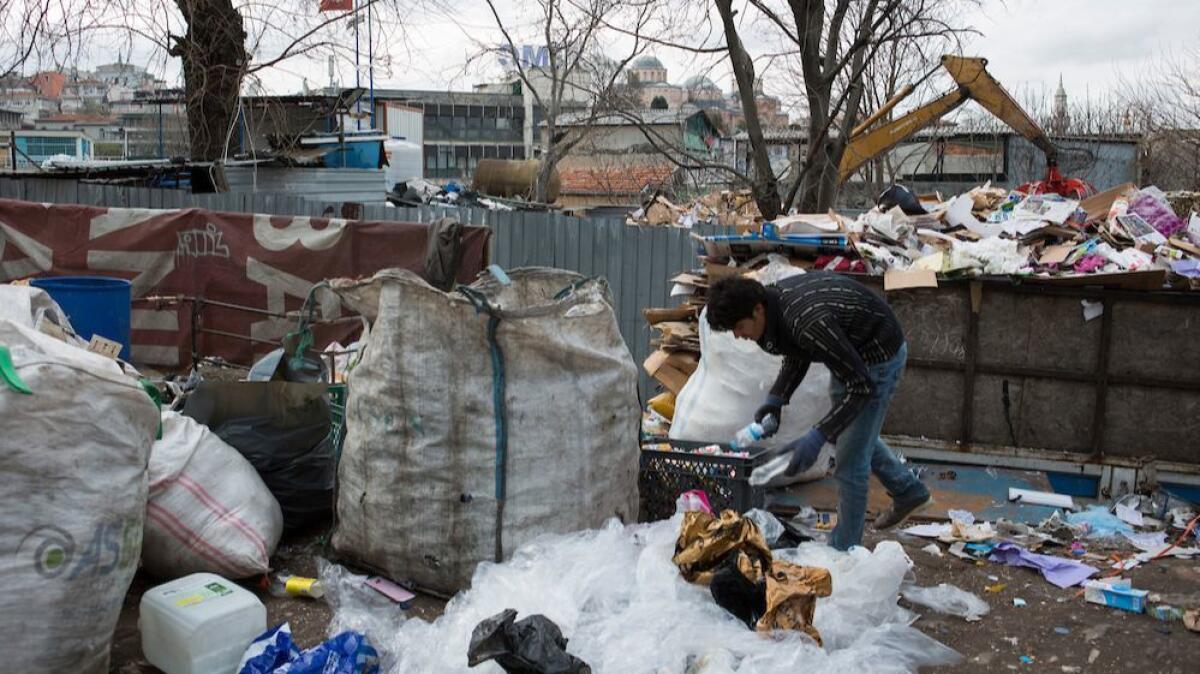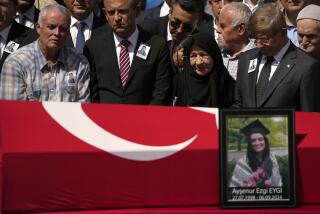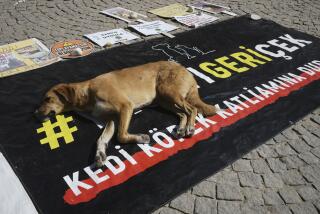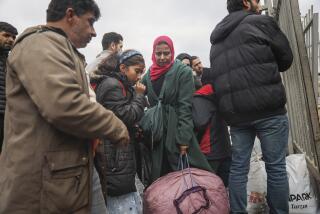Clashes erupt in Istanbul between Turks and migrants whose lives remain on hold

- Share via
Reporting from Istanbul — Turkish authorities on May 16 detained more than 300 undocumented migrants in Istanbul’s Sultanciftligi neighborhood — mostly from Pakistan and Afghanistan — after Turkish nationals and migrants clashed, resulting in the death of a Turkish man allegedly killed by an Afghan migrant.
It’s the latest outbreak of violence between migrants and locals in Turkey in the wake of simmering tensions. Human rights groups say Turkey has fast become an unsafe country for millions of migrants and refugees seeking to resettle in Europe.
Since 2014, Turkey has granted temporary special protection to nearly 3 million Syrians fleeing war, but this status is not available to Afghans, who can only apply for refugee status or political asylum in a third country and remain in Turkey while they await a decision.
According to the United Nations High Commissioner for Refugees (UNHCR), at the start of 2017, 120,529 Afghans applied for such a status and were awaiting a decision, but human rights organizations maintain that number represents a fraction of a larger flow of migrants. Every month, hundreds of Afghans from Afghanistan and second-generation Afghan refugees from Pakistan, along with Pakistani economic migrants from Pakistan, cross the Turkey-Iran border.
In March, Turkish Deputy Prime Minister Veysi Kaynak said around 30,000 of the migrants had been prosecuted in 2016, and as many as 3 million could cross in the future. Turkey has since announced it is working to build a 310-mile-long wall along the Iranian border. Human rights groups have said that while Syrians enjoy some protection in Turkey, migrants coming from Afghanistan and Pakistan live a precarious life, with inadequate housing and medical care, and little legal avenues for redress.
The recent detentions in Istanbul have been just one part of a tense week in Sultanciftligi, a lower-class neighborhood that is home to ethnic Kurds and Turks.
News of stabbings and disappearances have brought thousands of undocumented migrants living there under scrutiny, pushing most into hiding. On a normal afternoon, the neighborhood is teeming with young Afghan and Pakistani men, who spend up to 12 hours a day working in basement garment factories, and living in ramshackle, overcrowded apartments rented out by their employers.
“They are all hiding, or they have left, and if any of them walks around outside now, I think they would be in danger,” said a Turkish owner of a clothing shop who asked not to be identified.
According to Turkish police and Afghan and Pakistani diplomats, on the evening of May 14, a group of migrants catcalled a Turkish woman, and in response hundreds of locals confronted migrants living in the area. A Turkish man, Ramazan Sahin, 24, was stabbed to death by an unidentified Afghan, at which point scores of riot police and several armored cars arrived to disperse the crowds. But the next day, at Sahin’s funeral, crowds of locals and migrants again clashed.
Police then responded by raiding homes and rounding up hundreds of migrants.
Adeel Ahmed, 19, said he hid in his room in a nearby neighborhood with 17 other Pakistanis, where they shared videos and pictures of beatings and stabbings from the night before.
“We are very, very scared. We don’t know who is doing this. Nobody is safe anymore,” Adeel said, looking at one of the many videos, one of which showed a migrant being stabbed in the chest with knife.
Rumors of violence by locals have spread among migrants. One such rumor was that six Pakistanis had been killed in Sultanciftligi. Turkish, Afghan and Pakistani officials denied those allegations.
“These reports are absolutely false,” said Dildar Abro, vice consul at the Pakistani Consulate in Istanbul. “The police cordoned off the area, and when they came, because all these people were all illegal, they started running. Someone said someone was killed there, and this person told someone else two people were killed, and this rumor kept going.”
But Abro said networks of smugglers operating in the region have made life difficult for migrants, many of whom spent their life savings to come to Turkey in hopes of continuing to Europe, only to find themselves stuck. Every day the Pakistani consulate provides documents to 15-20 people who entered Turkey illegally to return home, and over the last two months, Abro has worked with Turkish police to free scores of migrants held for ransom in Istanbul.
In Istanbul’s Vefa district, Abdul Razak, 21, said he’s preparing to return to his home in Lagman, Afghanistan, six months after he scraped up $1,300 to be smuggled into Turkey. Razak, like many migrants who find themselves in dire straits in Istanbul, pulls a cart weighing hundreds of pounds through the city’s streets to collect plastic, glass and cardboard, to sell to Turkish recyclers. But on Friday, as he was making the rounds, he was attacked by five Turkish men, who he says seemed to be angry because of what had happened in Sultanciftligi.
“They stabbed me, in the left arm, and my right leg,” said Razak, surrounded by a dozen fellow migrants who are too scared to venture outside their homes. “A Turkish shopkeeper saw me and brought me into his shop until the attackers left.”
“I came here because I wanted to find a way to go to Europe, but now, I cannot go further, and I don’t feel safe here either,” Razak said.
Farooq and Nazish are special correspondents based in Istanbul.
More to Read
Sign up for Essential California
The most important California stories and recommendations in your inbox every morning.
You may occasionally receive promotional content from the Los Angeles Times.










